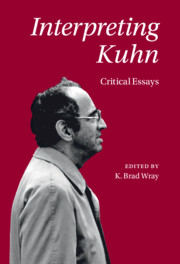Book contents
- Interpreting Kuhn
- Interpreting Kuhn
- Copyright page
- Dedication
- Contents
- Figures
- Contributors
- Acknowledgments
- Abbreviations
- Introduction
- Part I Foundational Issues
- Part II Three Core Concepts
- Part III Kuhnian Themes
- Chapter 8 The Copernican Revolution since Kuhn
- Chapter 9 Kuhn, the Duck, and the Rabbit – Perception, Theory-Ladenness, and Creativity in Science
- Chapter 10 Kuhn on Scientific Discovery as Endogenous
- Chapter 11 Truth, Incoherence, and the Evolution of Science
- Chapter 12 Reassessing Kuhn’s Theoretical Monism
- Bibliography
- Index
Chapter 10 - Kuhn on Scientific Discovery as Endogenous
from Part III - Kuhnian Themes
Published online by Cambridge University Press: 25 June 2021
- Interpreting Kuhn
- Interpreting Kuhn
- Copyright page
- Dedication
- Contents
- Figures
- Contributors
- Acknowledgments
- Abbreviations
- Introduction
- Part I Foundational Issues
- Part II Three Core Concepts
- Part III Kuhnian Themes
- Chapter 8 The Copernican Revolution since Kuhn
- Chapter 9 Kuhn, the Duck, and the Rabbit – Perception, Theory-Ladenness, and Creativity in Science
- Chapter 10 Kuhn on Scientific Discovery as Endogenous
- Chapter 11 Truth, Incoherence, and the Evolution of Science
- Chapter 12 Reassessing Kuhn’s Theoretical Monism
- Bibliography
- Index
Summary
Popper and the logical empiricists focused on the logical status of the products of research and made scientific discovery and invention, the processes of achieving creative breakthroughs, exogenous to the logic of science. Creative insights were the result of happy but accidental psychological experiences, of minimal cognitive interest. Kuhn, in Structure, attempted to endogenize discovery, to provide an account of the practice of scientific problem-solving but without employing traditional logic of discovery or justification. Key to his account of normal science was the role of exemplars (standardized problem solutions) and acquired resemblance relations (analogies, metaphors, similes). Kuhn’s account was insightful in suggesting that puzzle solving amounts to rhetoric-based problem reduction to existing exemplars, largely independent of theory reduction. While Kuhn helped to resurrect philosophical interest in the process of research, he was only partially successful. By taming discovery in normal science, he exacerbated his problem of understanding how revolutionary breaks are conceived. And he left us with several questions about exemplars. What, exactly, are exemplars and where do they come from? Can exemplars carry across revolutionary breaks? I employ examples from early quantum theory.
Keywords
- Type
- Chapter
- Information
- Interpreting KuhnCritical Essays, pp. 185 - 201Publisher: Cambridge University PressPrint publication year: 2021



